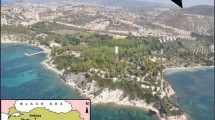Abstract
The main objective of this study is the determination of the slope stability and excavatability category of discontinuous rock exposed between 53+000 and 58+000 km of the proposed Ankara–Pozantı autoroad in Turkey to provide secure access. The study area is mostly in the outcrops of highly jointed sandstone with minor layers of marl. This Maastrichtian–Eocene Group also contains conglomerate and limestone bands of flysch character called the Pas˙ada* Group. Quaternary alluvial deposits occur throughout the site. The area was divided into four design sectors based on cut slope locations. Rock slope stability was assessed kinematically as well as through utilizing limit equilibrium analyses. The excavation category was determined to range from hard to extremely hard ripping. Remedial measures for unstable rock slopes are discussed.
Similar content being viewed by others
Author information
Authors and Affiliations
Additional information
Received: 22 July 1997 · Accepted: 14 April 1998
Rights and permissions
About this article
Cite this article
Avcı, K., Akgün, H. & Doyuran, V. Assessment of rock slope stability along the proposed Ankara–Pozantı autoroad in Turkey. Environmental Geology 37, 137–144 (1999). https://doi.org/10.1007/s002540050370
Issue Date:
DOI: https://doi.org/10.1007/s002540050370




